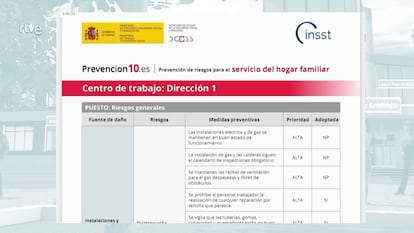In Spain there are 378,000 domestic workers affiliated with Social Security. These workers suffer greatly from precariousness: they earn on average 1,014 euros gross per month (less than half the 2023 average, 2,273) and their agreed working hours are the longest in the sector, with 39.9 hours per week (an hour and a half more than the average). The Ministry of Labor has already tried to alleviate these precarious conditions in 2022 by granting them a historically rejected right, that of unemployment benefits. Now he adds another one, which also applies to the rest of the employed and which was not yet valid for them: the assessment of professional risks in the workplace, at home. From this Friday, employers are required to evaluate these risks and inform their domestic workers of them and of the preventive measures adopted, under the threat of inspection sanctions in case of violation of this family duty.
To facilitate this process, Trabajo launched the free tool preventencion10.es six months ago. This site allows employers to risk assess their home to comply with this new requirement, but it has had problems in the last couple of days. At midday on Wednesday, users’ attempts to assess the risks failed. The dispatch took place on Thursday morning, still with specific problems, which the ministry had initially attributed to an excess of requests. Hours later, mid-afternoon Thursday, the ministry reported that the failures were due to an “arson attack,” a series of bot “automated” that would have “artificially” overloaded the platform.
According to data provided by Labor, a total of 16,091 suspicious Internet Protocol (IP) addresses were blocked in the last 24 hours, sending 49.4 million transactions. That is, almost 50 million attempts to access the platform to fill out the questionnaire. Ministry sources claim that more than one million requests have arrived from some blocked IPs.
When the instrument works, it works with simple dynamics. It consists of a responsible declaration in which the employer answers a questionnaire with a series of questions. In this article you can see how to complete the process step by step: at the beginning the address and identity of the employer are specified, then the tasks of the employee and in the questionnaire “yes” or “no” answers are given to specify the characteristics of the family unit. At the end, a PDF is generated which the employer does not have to hand over to any authority, it is sufficient to give a copy to the housekeeper and have another prepared in case the Inspectorate requests it.

Failure to carry out the self-assessment or failure to inform domestic workers about the preventive measures adopted may be classified as a serious infringement by the Inspectorate. The highest penalty with this fee is 49,180 euros at its maximum level. Díaz’s department emphasizes that these types of sanctions will only be applied in the presence of aggravating circumstances. Without them, in most cases, non-compliance would be considered minor and the fine would be a maximum of 2,450 euros. Inspectors will not be able to access homes to ensure compliance with the measures, but will be able to request documentation and investigate based on complaints.
Missed deadlines for work
The decree regulating this new right establishes other measures that the Ministry of Labor did not complete in time. In March, eight months ago, the limit that Yolanda Díaz’s department had set itself to develop a training platform on risk prevention for domestic workers expired. Furthermore, it does not meet the deadline set for the development of an action protocol against situations of harassment and violence suffered by these professionals and for completing a technical guide for risk prevention. Both documents should have been available in September and there is no trace of them.
The ministry recognizes the delay in the training platform, underlines that the Sepe resolution that will regulate it is ready and that the service will be operational at the beginning of the year. Regarding the protocol and the technical guide, it is also confirmed that they are not yet available, but it is highlighted that their publication is imminent and underlines their technical complexity and consensus.
Furthermore, the Ministry of Health undertakes to “promote” the provision of free medical visits for these professionals and to include this possibility in the portfolio of common services of the National Health System. This promise is not expected and is not kept. The Ministry chaired by Mónica García claims that work is being done on the Presentation of Health at Work.
Both the UGT and the CC OO celebrate the implementation of the new law for domestic workers, but at the same time criticize the delays suffered by Labor. “We believe that we must be more serious and respect deadlines better. I know that the professionals of the INSST are working on the protocol and the guide, but when we commit to something we must respect it otherwise we are faced with frustrated expectations”, says the confederal secretary of occupational health of the CC OO, Mariano Sanz. Patricia Ruiz, secretary of Occupational Health of the UGT, asks the Inspectorate not to have a “punitive” approach. That is, contextualize any non-compliance in the first few days before embarking on any sanctions.
foreign women
This new right will benefit domestic workers who contribute to Social Security, but not the thousands of them in an irregular situation (although the Inspectorate can request the assessment for them too). This activity is one of those that reports a greater gap between administrative statistics on employment (social security affiliation) and that prepared in the form of a survey (the EPA of the INE). The first records taxpayers and the second the total number of people employed, including those working outside the formal economy. The latest data for each statistic shows a total of 378,000 affiliates (in October) and 539,000 employed (in the third quarter). This does not mean that the entire gap corresponds to irregular employees, but it helps to get closer to the size of this phenomenon.
In recent years there has been a decline in both statistics, particularly evident in the Survey of the active population. According to the data from the third quarter of this study, it is the business branch that has recorded the greatest decline in both absolute (-53,000) and relative terms (-8.9%) over the last year. The contraction is even more evident if placed in context with the rest of the labor market: in the same period Spain gained 564,000 jobs, with an increase of 2.6%.
This sector with very precarious conditions is the one with the highest percentage of foreign and dual national workers (66%, compared to the EPA average of 20%) and also the highest participation of women (93%).

Why is the number of female workers decreasing?
Specialists differ in identifying the causes of this phenomenon, which has picked up speed in recent months. The Spanish Association of Personal and Domestic Services (AESPD), the main employers’ association in the sector, believes that the most important explanation is the improvement of working conditions, which highlights the dramatic increase in the interprofessional minimum wage in a sector without specific agreements (the SMI has grown by 61% since 2018, up to 1,184 euros gross per month), the right to unemployment benefits from 2022 (which implies a new contribution expense for the employer work) or the new legislation on the prevention of risks at work, in force from this Friday. He believes that all this pushes some families to give up their domestic workers or to defraud Social Security by employing them in B.
CC OO’s Secretary of Public Policies and Social Protection, Carlos Bravo, recently called for the Inspectorate to act in the face of this possible increase in irregular work: “I believe that awareness campaigns to alert employers to the coverage they must give to workers are decisive and have not been done for a long time. More work by inspectors is needed, as word of mouth between employers works.”

In a recent report in this newspaper on the phenomenon, the Ministry of Labor considered that part of the contraction of the domestic worker regime is due to the fact that some of these employees now work in companies that provide these services. “There is therefore a transfer of belonging to the general regime,” said Yolanda Díaz’s minister.
Other analysts believe that this decline hides an improvement in the Spanish productive fabric. “It’s about improving the quality of employment. When people have the opportunity to work in sectors with better conditions, they do so,” said UGT deputy secretary general of trade union policy, Fernando Luján.



